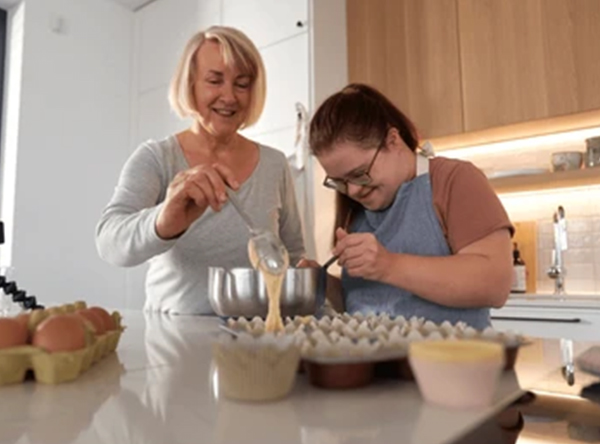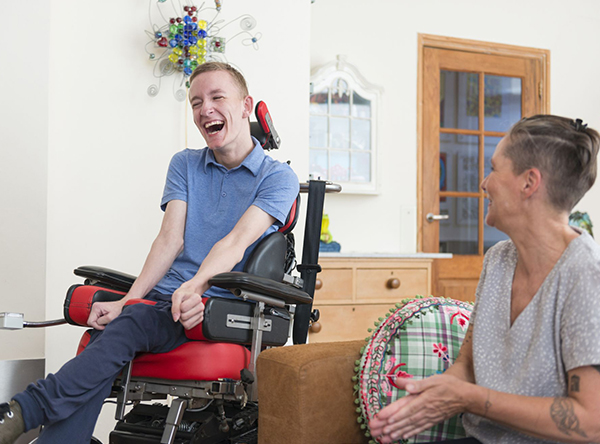


Intensive and Complex Behaviour Support is provided to individuals who frequently display behaviours of concern that significantly impact their own or others' safety and well-being. This requires the implementation of daily, intensive proactive strategies, skill-building, and response strategies.
This specialised support is needed when an individual’s behaviours are compounded by additional complexities, such as co-occurring diagnoses, a history of trauma, or other significant factors. A number of common factors and scenarios may indicate a need for intensive and complex behaviour support under the National Disability Insurance Scheme (NDIS). These can be supported through:
These are behaviours that may cause harm to the individual or others, or significantly impact their quality of life and ability to participate in the community. Examples include:
These behaviours can often be influenced by a wide range of factors. A holistic approach to support recognises that intensive and complex behaviour support may be beneficial when behaviours are linked to various underlying elements, including:
A person's behaviour is the result of many interacting factors, and it's essential to consider the full context of their life and circumstances.
The need for intensive support is often amplified when a person's situation involves additional challenges. These complexities can make it difficult for standard supports to be effective. This may be the case if a participant:
High Intensity Support is a specialised type of care for participants who have complex health needs and require a high level of care.
This type of support focuses on daily personal activities that are complex and require specific skills and training to be delivered safely. The goal of our High Intensity Support is to ensure the safety and well-being of participants with complex health needs, empowering them to live independently in their own homes and communities.
The NDIS Quality and Safeguards Commission has a specific list of activities that are considered high-intensity due to the required specialised training to perform safely.
Our support workers who deliver this care have specific training and competencies, developed with a qualified health practitioner and continual support from the Myxa team.
At Myxa, our difference is not only what we deliver, but how we deliver it. Our structured framework ensures consistency, compliance, and compassion.

Myxa follows a comprehensive transition process to gather and review all relevant information from participants, families, previous providers, and allied health professionals.
This includes medical history, behavioural strategies, communication needs, and cultural or religious considerations.
This ensures staff deliver personalised, respectful support tailored to everyone’s preferences and goals. Clear communication help create a smooth, positive transition, while ongoing monitoring allows for timely adjustments to maintain continuity and quality of care.
As part of the Intake Process, Myxa captures each participant’s dietary preferences, cultural requirements, allergies, and any medical or therapeutic dietary needs.
This information is used to develop a tailored weekly menu that supports the participant’s health, wellbeing, and individual choices.
Menu planning is conducted in consultation with the participant, their family or guardian (where appropriate), and relevant Allied Health professionals such as dietitians or speech pathologists. The focus is on fresh food and providing nutritious, enjoyable meals while respecting personal preferences, religious or cultural considerations, and any swallowing or texture-modified requirements.
Staff are trained to support safe food preparation practices and are guided by Mealtime Management Plans where applicable.
As part of the Myxa interview process, we assess prospective employees’ level of cooking experience.
Myxa supports participants to engage in community activities that reflect their individual interests, goals, and preferences.
We prioritise identifying accessible and enjoyable opportunities, including free or low-cost options, to promote social inclusion, skill development, and overall wellbeing.
To ensure activities are meaningful and tailored, Myxa works with participants to develop a weekly planner using communication methods they understand, whether verbal, visual, or assistive technologies.
This approach empowers participants to have choice and control over their community involvement.
Staff assist with planning and facilitating outings while maintaining safety and comfort
When applicable, Myxa will provide a dedicated vehicle available 24/7 onsite to support the participant’s community access needs, including (but not limited to) shopping, medical appointments, and recreational activities.
When selecting a vehicle, Myxa prioritises safety considering any known behaviours of concern to ensure the wellbeing of the participant, staff, and the wider community.
Support Plans are one of the main pillars of Myxa’s Support Framework. They ensure safe, consistent, and person-centred care by translating clinical and behavioural recommendations into daily practice.
Developed by Myxa’s experienced management team, each plan integrates input from nurses, Behaviour Support Practitioners, and allied health professionals such as occupational therapists and speech pathologists.
For participants with High Physical Support needs, the plan outlines clear, step-by-step procedures for complex tasks like enteral feeding, tracheostomy care, or manual handling. For those with complex behavioural needs, it works alongside the Behaviour Support Plan and other allied health report (eg. OT Functional Capacity Assessment) to define proactive and reactive strategies, supervision requirements, and staff competencies, ensuring every support interaction is safe, therapeutic, and aligned with the participant’s goals.
Each property has a dedicated House Supervisor in a leadership role who provides direct support and undertakes administrative duties.
They are responsible for ensuring that Myxa meets its obligations, and that staff are following Participant Support Plans and Behaviour Support Plans. House Supervisors also identify areas for improvement and communicate these to the SIL Manager.
The SIL Manager is responsible for ensuring high-quality, person-centred services, delivered in line with NDIS Practice Standards and regulatory requirements.
They oversee compliance, participant safeguarding, and incident management, ensuring that all obligations are consistently met.
SIL Managers work closely with the Care Team, including Allied Health professionals and Support Coordinators, to ensure support strategies align with participants' goals and needs and lead risk management processes.
In addition, SIL Managers monitor service delivery, identify areas for improvement, and drive continuous quality improvement to ensure every participant receives safe, responsive, and empowering support.
They provide guidance and supervision to House Supervisors and play an active role in staff development and performance management.
Myxa Senior Management team collaboratively provides the foundational oversight for our high-intensity and complex behaviour support services, dedicated to maintaining professional excellence while championing a person-centred approach. Our leaders establish the strategic vision for quality, ensuring that our robust clinical governance framework is consistently applied across all operations. This professional stewardship guarantees the seamless integration of our services, providing the necessary support structure for our House Supervisors and SIL Managers.
Myxa’s Centralised Rostering Team ensures consistency and quality across all services by managing workforce coordination through a unified system. This centralised approach allows us to match Disability Support Workers to participants based on skills, compatibility, and needs, providing stability and continuity of care.
By handling scheduling centrally, House Supervisors and SIL Managers are freed to focus on service quality, mentoring, and participant outcomes rather than administrative coordination. The rostering team also works closely with Human Resources and training to align staff capability with participant requirements, strengthening accountability and supporting Myxa’s culture of care and excellence.
Myxa operates a robust in-house Facility Team responsible for maintaining the safety, functionality, and presentation of all Myxa properties. The team oversees repairs, preventative maintenance, and improvement works across every site, ensuring that participant environments remain compliant, comfortable, and reflective of Myxa’s quality standards. By managing these tasks internally, Myxa avoids long waiting times for external contractors and responds quickly to emerging needs. The Facility Team works collaboratively with SIL Managers, House Supervisors, and the Quality and Compliance department to ensure every home environment supports participant wellbeing and service continuity. Their work reinforces a core principle of the Myxa Framework: the quality of support is inseparable from the quality of the environment in which it is delivered.


All staff complete a comprehensive induction on joining, followed by ongoing general training and refreshers. Depending on each participant’s specific needs, we deliver targeted, participant-specific training.
For example, Ethical Response training equips staff to support people who may display physical aggression, self-harm, or property damage safely and respectfully, and in line with Behaviour Support Plans.
Myxa actively collaborates with Allied Health professionals to deliver targeted training not only for Support Workers, but also for Human Resources and Rostering teams. This ensures a clear understanding of the skill levels required to appropriately match staff to participant needs.
An after-hours phone line is available for staff to seek approval for administering PRN medication.
Each participant has an individualised PRN Protocol that must be followed, ensuring all Behaviour Support Plan (BSP) strategies are implemented prior to authorisation.
Myxa has a robust after-hours framework to ensure both participants and staff are fully supported.
APO works closely with the behavioural
Practitioners to review and submit restrictive practises for approval.
Myxa aim to provide support with the least restrictive practises. Myxa is registered for module 2A and authorised to implement restive practises
Myxa works closely with the Care Team to identify essential data requirements and assess whether additional data is needed to support accurate assessments, staff guidance, and future NDIS Plan Reviews.
Data is collected via QR codes, enabling SIL Managers to access real-time information and provide timely feedback to the Care Team as needed.
Myxa develop comprehensive quality management systems to ensure compliance with NDIS standards and structure governance.
Our Incident and Management System, provides a comprehensive system rooted in a blame-free culture. Its core purpose is to actively encourage our workers to submit all kinds of incidents—from near misses to major events—so that we can rigorously review each one. By thoroughly analysing these occurrences, we can continuously update and improve our existing system, ensuring that we effectively learn from the past and ultimately remove similar incidents in the future.

Many participants receive both types of specialised support. Myxa’s integrated model ensures coordination between Registered Nurses, Behaviour Support Practitioners, SIL Managers, and House Supervisors. This collaboration ensures every participant’s care is consistent, safe, and aligned with best practice across both health and behavioural domains.
Depending on the participant’s plan and BSP, supports may include:
Behaviour Support Plans are developed by an NDIS-registered Behaviour Support Practitioner after completing a functional behaviour assessment. At Myxa, implementation involves assessment, plan development, implementation, and regular monitoring. Restricted practices are only implemented where authorised and reported according to NDIS Commission requirements.
Intensive and Complex Behaviour Support applies when a participant regularly displays behaviours of concern that significantly affect their safety or the safety of others. This requires structured routines, proactive strategies, and consistent staffing to ensure safety and wellbeing.
High Intensity Support is funded under the NDIS Core Supports budget — category Assistance with Daily Life (Support Category 1). This category recognises the need for workers with higher training and clinical oversight. For reference, see the NDIS Practice Standards – High Intensity Daily Personal Activities.
High Intensity Supports are provided by Myxa Support Workers who have completed approved High Intensity Support training modules under the guidance of a qualified health practitioner or Registered Nurse. This includes specific competency training, instruction in recognising health changes, and ongoing supervision by Myxa’s Clinical Governance Team.
High Intensity Support is specialised assistance for people with complex health conditions that require staff with specific training and competency to perform tasks safely. While Myxa is not a clinical provider, we work in close partnership with qualified health practitioners to support participants who live with these complex health conditions in their homes and communities.
The NDIS Quality and Safeguards Commission defines the following activities as High Intensity Daily Personal Activities:
Each task is delivered by trained and competent Support Workers following an approved care plan developed by a qualified health professional. Ongoing training, competency checks, and supervision ensure that each participant’s care is safe, consistent, and aligned with NDIS Practice Standards.
These are two distinct but related NDIS categories requiring specialised skills:
Both require advanced training and collaboration across a multidisciplinary team, including Support Workers, Allied Health Practitioners, Behaviour Support Practitioners, and Support Coordinators.